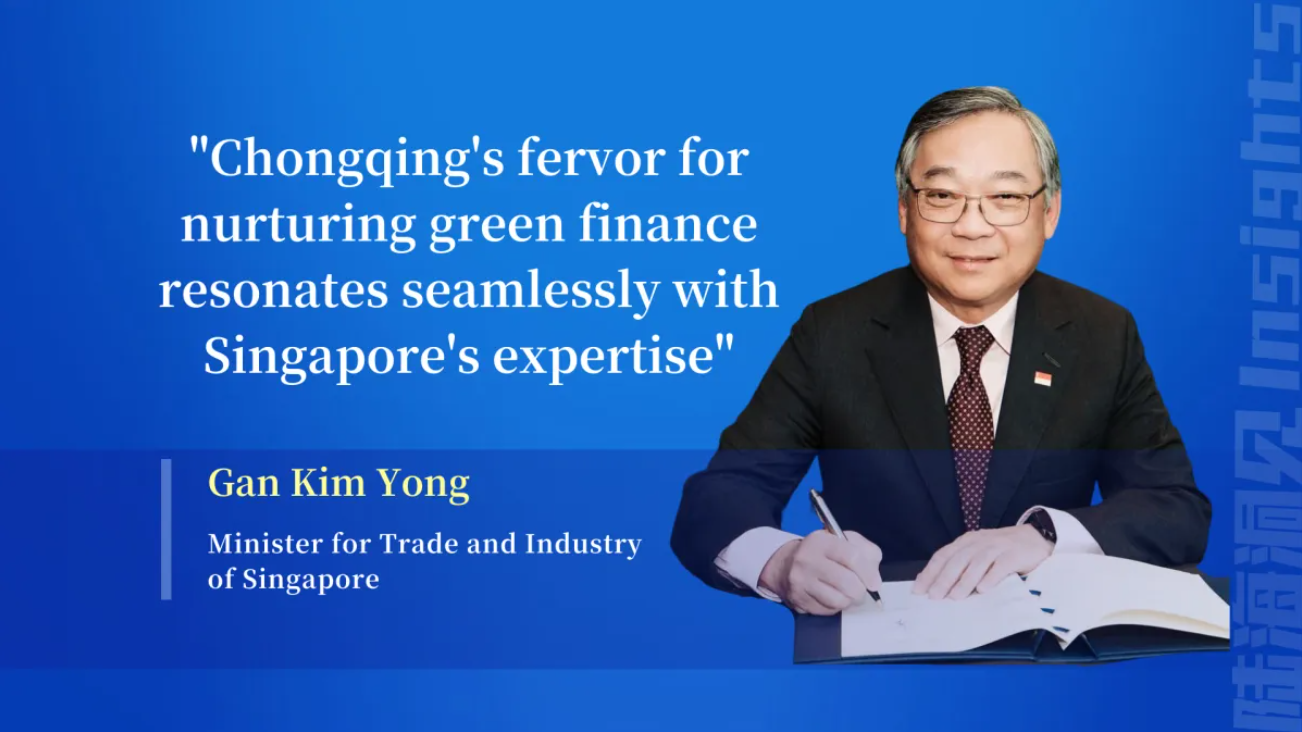Chongqing- "China has taken a proactive role in green finance, enthusiastically discussing green finance and relevant laws and regulations," said Mr. Gan Kim Yong, Minister for Trade and Industry of Singapore (MTI), during a fireside chat at the 15th Chinese Journalists Visit Programme (CJVP) on July 27. "Sustainability and climate change, as global issues, mandate collective action from nations around the globe."

Gan Kim Yong, Minister for Trade and Industry of Singapore. (Graphic/ Chen Yingzhu)
Nurturing sustainable projects in Chongqing
Chongqing, a predominant industrial epicenter in southwest China, is actively establishing Green Financial Reform and Innovation Pilot Zones. These zones are designed to foster an environment conducive to sustainable financing. With this ambition in sight, Chongqing has enlisted Singapore's expertise to refine its green finance capabilities.
During the 2023 China-Singapore (Chongqing) Connectivity Initiative Financial Summit (CCI-FS), Ravi Menon, Managing Director of the Monetary Authority of Singapore, delineated potential collaborative avenues between Chongqing and Singapore, anchored in the endeavors of the China-Singapore Green Finance Taskforce. This joint venture is set to nurture viable green initiatives within Chongqing's pilot zone through a comprehensive evaluation.
Furthermore, both Chongqing and Singapore are streamlining application protocols for eligible businesses in Western China, enabling them to secure sustainable finance on an international scale. This initiative builds upon preliminary pilot projects executed in Chongqing and Chengdu.
Minister Gan also spotlighted Singapore's proactive commitment to green innovation, as illustrated by the Green Economy Regulatory Initiative spearheaded by MTI. This initiative converges sandbox experiments conducted by diverse regulatory bodies in Singapore. Its primary aim is to expedite the evolution of green products and services while providing enterprises with prompt feedback and assistance.
Expounding further, Gan stated that one effective strategy involves offering enterprises a heads-up, a timeline detailing the present tax structure and its biennial increments. Key agencies like the Economic Development Board and Energy Market Authority engage directly with businesses, guiding them towards achieving reduced carbon emissions.
Synergizing Chongqing's Vision with Singapore's Prowess
Navigating the intricacies of green finance, Gan underscored the necessity of precisely categorizing green initiatives to ensure alignment with sustainability objectives.
Using China's coal power plants as a case in point, Gan pointed out that banks are contemplating financing their premature closure to diminish carbon emissions. Yet, delineating what precisely constitutes a green project can be intricate, making global collaboration imperative in devising universally accepted guidelines.
"Singapore, leading the way in Asia, has already implemented a carbon tax, offering support, subsidies, and assistance to businesses transitioning to low-carbon models," said Gan.
From Gan's perspective, Chongqing's fervor for nurturing green finance resonates seamlessly with Singapore's expertise. Their collaboration is poised to be a catalyst for eco-conscious endeavors. Sharing their collective wealth of knowledge and resources, both regions are primed to expedite the shift towards a greener economy. This includes championing transformative projects such as carbon capture innovations, electric vehicle integration, and industry-wide decarbonization.
As Chongqing's green finance infrastructure crystallizes, its synergy with Singapore signifies a watershed moment in the region's quest for sustainability. Their collaborative spirit serves as a global benchmark, epitomizing how two economic titans can collaboratively surmount environmental challenges.
扫一扫在手机打开当前页